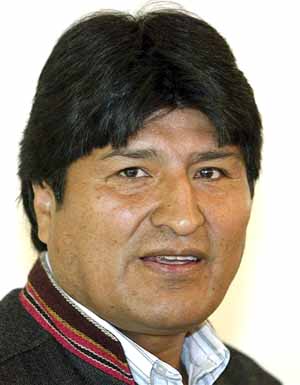Recall referendum on Bolivian President Evo Morales set for August 10
 La Paz - A recall referendum on Bolivian President Evo Morales is to take place on August 10, according to legislation that was signed into law Monday at the presidential palace in la Paz.
La Paz - A recall referendum on Bolivian President Evo Morales is to take place on August 10, according to legislation that was signed into law Monday at the presidential palace in la Paz.
"I am not scared of the vote," Morales said.
The same ballot would include votes on whether Morales' vice president and the governors of eight of Bolivia's nine provinces continue in office.
Morales, a left-wing populist, was elected with 53.7 per cent of the vote in December 2005 to become the first Bolivian president of indigenous descent.
The recall legislation, originally proposed by Morales himself in December, was approved by surprise Thursday by the opposition- controlled Bolivian Senate. Under the measure, Morales' election will be revoked if more than 53.7 per cent of the electorate votes for the referendum.
If the recall is successful, Morales is required to immediately call a general election within 90 to 180 days for a new five-year presidential term. He would be barred from running in the follow-up election, because Bolivia's constitution forbids a president from seeking consecutive terms.
By the same formula, some of Bolivia's governors could be recalled on the same ballot with much lower percentages - as little as 37.7 per cent, depending on the percentage of the vote by which they were elected.
The referendum is the latest episode in the struggle between Morales and the country's conservative opposition, which accuses him of trying impose socialism.
Morales has nationalized foreign-owned energy companies and other firms, arguing that he needs the revenue for government programmes to redistribute natural-resource wealth to Bolivia's impoverished, indigenous majority.
His policies have been fiercely opposed by the more affluent provinces where much of those natural resources are derived. In a non-binding referendum, held on May 4 in Santa Cruz over Morales' objections, 84 per cent of provincial voters supported a proposal for greater regional autonomy. (dpa)